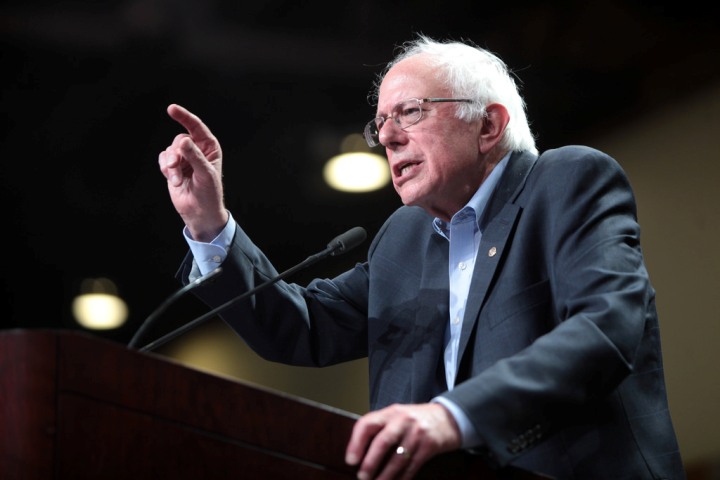UPDATE 2-Surging Sanders to be in the crosshairs at South Carolina Democratic debate

- Country:
- United States
Surging front-runner Bernie Sanders will be in the hot seat at the Democratic debate in South Carolina on Tuesday when his six presidential rivals try to derail his growing momentum before the next big round of nominating contests. Free-spending billionaire Michael Bloomberg, who had a rough debut on the debate stage last week in Nevada, also will be back in the spotlight at the candidates' final encounter before Saturday's South Carolina primary and next week's 14 vital Super Tuesday contests.
The pressure for a strong performance will be high for all of the contenders. Joe Biden, the national front-runner not so long ago, needs to win South Carolina to keep his campaign alive, while Pete Buttigieg, Elizabeth Warren, Amy Klobuchar, and Tom Steyer are desperately battling for relevance. It will be the third debate this month, and the 10th overall, for the Democrats vying for the right to challenge Republican President Donald Trump in the Nov. 3 election. Tuesday's face-off will run from 8 p.m. to 10:15 p.m. ET (0100 to 0315 GMT).
The encounters have grown more contentious as time runs out. "Sanders will probably be the focus of attacks this time, but I expect there are going to be several people in the line of fire from all directions," said Kelly Dietrich, a Democratic strategist who trains candidates.
Sanders, an independent senator from Vermont and a self-identified democratic socialist, has taken command of the race after strong showings in the first three nominating contests in Iowa, New Hampshire and Nevada. His momentum has alarmed a Democratic establishment wary of his aggressive economic equality and social justice agenda. BIDEN SLAPS SANDERS' MATH
Sanders on Monday issued his most comprehensive summary yet on how, largely through taxes on corporations and "extreme wealth," he intends to pay for his progressive plans, such as providing medical care for all Americans. For example, his campaign said on its website that the $2.2 trillion cost of making public college, university and trade schools tuition-free could be met over a decade with a "Wall Street speculation tax," including a 0.5% tax on stock trades, a 0.1% fee on bond trades and a 0.005% fee on dividends.
His $16.3 trillion climate change proposal would be paid for with fees and taxes on fossil fuel companies and by reducing defense spending, as well as projected tax revenue increases from new jobs it would create. But critics have said the plans do not add up.
Biden's deputy campaign manager Kate Bedingfield said in a statement that Sanders' "back-of-the-napkin math" did not even begin to cover the full costs, including leaving half of the at- least $30 trillion price tag for his "Medicare for All" unexplained. CHALLENGE FOR BUTTIGIEG, OTHERS
At last week's debate, candidates launched a volley of scathing attacks on Bloomberg, the former New York City mayor, who had been rising in polls after an unprecedented spending spree on ads. Bloomberg will need to rebound at Tuesday's debate to keep his momentum alive. He entered the race in November and is skipping the four early voting states to focus on later contests, starting with Super Tuesday, when 14 states vote.
U.S. Representative Greg Meeks of New York, a Bloomberg backer, told reporters at a campaign press conference in Charleston that Bloomberg had a "poor response" when he came under fire from all sides in the last debate. "He's got to defend himself. I think he did better in the second half of the debate. And I think that you'll see a 180-degree shift tonight," Meeks said.
Buttigieg, the moderate former mayor of South Bend, Indiana, has led the charge against Sanders, labeling him a polarizing candidate who would repel new voters. But Buttigieg could also face one of his most challenging debates. South Carolina and its large bloc of black voters will be a test of whether he can improve on what polls show is his lack of appeal to African Americans.
The debate stakes will be high as well for Biden, the former vice president. He is counting on a win in South Carolina, given his popularity among black voters, who make up more than half of the Democratic electorate in the Southern state. Biden has led opinion polls in the state, but Sanders has been chipping away at his support and showed signs in Nevada he has expanded his backing to a more diverse electorate. Sanders won most of the state's sizable Latino voting bloc, entrance polls showed, and finished second to Biden among black voters.
Steyer, an activist billionaire who also has spent his own money heavily on his campaign, will return to the debate stage after failing to qualify in Nevada. He could make a difference in South Carolina, where polls show he has his greatest strength. He registers third there in the Real Clear Politics average of state polls.
The debate might provide a make-or-break moment for Klobuchar and Warren, senators from Minnesota and Massachusetts respectively, whose lagging campaigns badly need a boost. "Some of these candidates are likely to begin facing questions from the moderators about why they are staying in the race," said Mitchell McKinney, a political scientist and debate expert at the University of Missouri.
(This story has not been edited by Devdiscourse staff and is auto-generated from a syndicated feed.)










